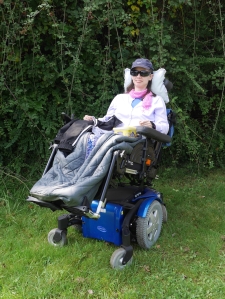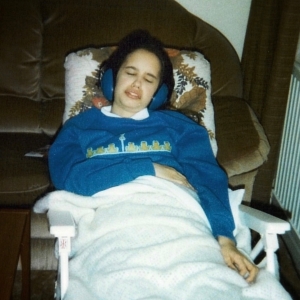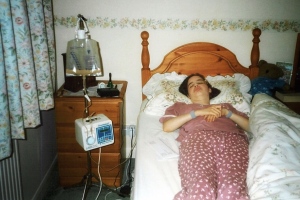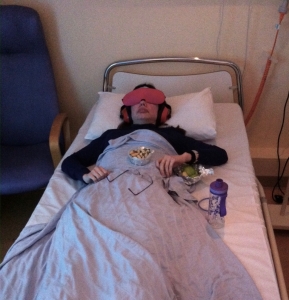In September 2016, I contributed to a training course for junior doctors at my local hospital. The following was used as part of a seminar entitled “Patients and doctors as partners in learning”. I used the term ME/CFS for this piece, as this is how ME is known within the NHS

Introduction
As a doctor, and perhaps especially as a junior doctor, there will no doubt be occasions when you are overwhelmed by the demands placed upon you. Times when you will feel powerless in the face of suffering and frustrated by the limitations of medicine. What you might not realise – and could easily forget in your most difficult hours as a doctor – is that in every single encounter with a patient, you have the potential to transform their life.
You can do this through something incredibly simple: by listening.
Such a basic act may at first appear insignificant. But today I invite you to consider that the ability to listen is one of the most powerful tools you have at your disposal.
Today I invite you to consider that the ability to listen is one of the most powerful tools you have at your disposal
True listening means not just hearing the words that are spoken, but actually listening to what is being said. Having the humility to suspend your own judgements and pre-conceptions, and to listen with fresh ears. Viewing the patient before you as someone who might teach you truths you could never have learned through a textbook or in a lecture. As well as receiving insights you would not otherwise have gained, you will in turn be giving something invaluable to your patient.
About me
My name is Naomi Whittingham and I am 39 years old. For 27 years I have lived with a severe form of ME/CFS. Unless you have had personal experience of this illness, it is likely that you have pre-conceptions as to the nature and cause of it. If so, I ask you to listen in the way I have described above: to hear my story as it is, and not as you might expect it to be.

I fell ill at the age of 12, when I was struck down by a virus. At first it appeared to be flu, but I never recovered and became steadily more ill. I suffered agonising headaches, fever, swollen glands and aching muscles. I had been a happy and active young girl, but within a couple of months I had lost the ability to walk. A few months after that I was so ill that I couldn’t move any part of my body. My arms and legs were totally paralysed, and I was unable to speak or open my eyes. The pain was so intense that I could think of nothing beyond drawing my next breath. My mother sat beside my bed in silence for weeks, watching to check that I didn’t stop breathing. My GP later admitted that each time he visited, he feared finding me dead. I survived, but for years it was a living death.
My mother sat beside my bed in silence for weeks, watching to check that I didn’t stop breathing. My GP later admitted that each time he visited, he feared finding me dead
The decades since have been a long, relentless struggle to improve. I remain housebound, in a wheelchair and dependent on full-time care, but my symptoms are less intense and I have some quality of life.
Severe illness colours every aspect of life. The most extraordinary resilience is required to survive each day. When illness stretches into years and decades of duration, the demands on the patient and their loved ones defy expression. Like many others with a long-term condition, I have learnt to make the most of what I have, and to find pleasure in simple things. Despite the most extreme trials, I have a sense of humour and a passion for life. I am highly motivated and positive.

When a patient isn’t heard
My illness has been devastating, but what has come closest to destroying my spirit has been the way I have often been treated by the medical profession. ME/CFS is still not well understood today, but was even less so in 1990 when I became ill. Many of the doctors I have been involved with over the years have seen my illness as a psychological one. Although inaccurate, this might not have been so destructive had they responded with the compassion due to such a condition. Sadly the opposite was true. Most viewed my illness as either self-inflicted, or believed it could be cured if only I was prepared to make enough effort to get better. I have encountered doctors who have reduced me to tears with their rudeness; others who have been so abusive that the damage remains with me decades later. No one should be treated this way, let alone when ill and vulnerable.
I have encountered doctors who have reduced me to tears with their rudeness; others who have been so abusive that the damage remains with me decades later
There is extensive research evidence showing that my illness is a biological one, affecting all bodily systems, but that is not the focus of what I wish to talk to you about today. The way I have been treated by the medical profession raises broader issues that are relevant to all doctors and all conditions.
The primary issue in my mistreatment has been a catastrophic failure on the part of professionals to listen. On so many occasions, my voice has been ignored by professionals convinced that anything I had to say was irrelevant, because they knew better. My opinions and views were invalid, for no reason other than that I was the one expressing them. As the patient, I couldn’t possibly know anything about myself or my health.

When psychological explanations were offered for my symptoms in the early years, nobody was willing to listen to the people who knew me best, such as my family and teachers – and, of course, me. After spending just a few minutes in my company, doctors generally assumed they knew me better than anyone else. A brief conversation was sufficient for them to confidently assert that my physical collapse stemmed from faulty family relations or trouble at school. In reality there was nothing to support the theory that I would choose to remove myself from normal life, but any attempt to explain this was seen as confirmation of mental instability.
My opinions and views were invalid, for no reason other than that I was the one expressing them. As the patient, I couldn’t possibly know anything about myself or my health
My voice was ignored when I said that I was physically incapable of an activity. On numerous occasions I was physically hauled to my feet and forced to walk. With my legs buckling under me so that I frequently collapsed to the floor, I was forced along corridors in hospital, or up the stairs at home. I begged and pleaded to be allowed to stop, but nobody listened. These are but brief examples of sustained mistreatment that stretched over many years. The woefully misguided attempts to force me out of illness included stripping me of all autonomy and denying me any say in my treatment. To do the story any justice would require more time and depth than I can devote here. What I can say is that being treated in this way hastened my decline, and caused terrible, lasting physical and emotional damage. And I know that it is still happening to others today.
The woefully misguided attempts to force me out of illness included stripping me of all autonomy and denying me any say in my treatment
All it would have taken was for someone to listen – really listen – and to respect my perspective as one that could and should be trusted. Had this happened, the course of my illness would have been very different. I would have received treatment that was appropriate to my needs, and which allowed my body the chance to gently heal, rather than being forced into activity that only worsened my suffering and left me permanently disabled.

The limitations of medical science
Many of the illnesses unquestioningly accepted by medicine today were historically viewed with suspicion. Epilepsy, multiple sclerosis, ulcerative colitis and tuberculosis are just a few examples of conditions that were once dismissed as an expression of mental distress, before science caught up and offered a rather more accurate explanation. I believe that my illness, ME/CFS, is the latest in a long line of such conditions, and that it too will one day be fully accepted by the medical profession as a biological illness.
Epilepsy, multiple sclerosis, ulcerative colitis and tuberculosis are just a few examples of conditions that were once dismissed as an expression of mental distress, before science caught up and offered a rather more accurate explanation
However, there will always be illnesses that cannot adequately be explained by current medical science. There will always be limitations to the tests that can be performed and the abnormalities that can be demonstrated in a clinical setting. And, of course, there will always be those who genuinely do have a psychological illness. I strongly believe that none of this should have any impact on the care and respect afforded to a patient. A person’s lab results should not be their route to a doctor’s basic courtesy.
Remember that history does not always look kindly on beliefs that were once firmly held by the medical establishment. In relatively recent times, for instance, homosexuality was held to be a mental illness warranting the most barbaric treatment. Before challenging a patient, a wise doctor might first question the accepted orthodoxy of the day.
When a patient’s perspective is viewed as invalid, compassion becomes an early casualty
When I see a doctor, it should be irrelevant whether they believe my illness is of physical or psychological origin, or even whether they think I am not ill at all and merely in some state of existential distress. I should receive the same level of care and compassion regardless. I should be treated with respect and my words heard. Because when a patient’s perspective is viewed as invalid, compassion becomes an early casualty. Accuracy is also compromised: when you cease to listen to the one person experiencing the illness you are attempting to treat, terrible mistakes can and will be made.
Getting it right
I began by saying that you have the power to transform a patient’s life simply through listening. Let me give you a simple example of how this can happen.
Last year I had to go to hospital for a bone scan and a meeting with a consultant. This was a huge undertaking for me, as any travel outside of my home causes a rapid worsening of symptoms. In common with many others with severe ME, I have acute sensory sensitivities which make a busy hospital environment a place of torture. This hospital trip had the potential to cause me tremendous suffering and trigger a major worsening of my condition.

Such a crisis was averted because of the wonderful staff at the rheumatology outpatients department who took the time to listen to and understand my needs. I feared they would dismiss me as demanding and attention-seeking, as many have before. Thankfully they listened, and recognised that what I asked for was not only essential to my wellbeing, it also allowed the process to run as smoothly as possible for everyone involved. Not only was the experience considerably less traumatic for me as a result of my limitations being respected, it also meant that the staff weren’t dealing with someone rendered incoherent with pain.
When seriously ill, having genuine cause to fear contact with the medical profession is not a good basis for managing one’s condition
I was given a bed in a quiet corner of the day ward to allow me to rest and recover from the car journey, and again after the scan. The consultant came to talk to me while I was lying in bed, to save me having to sit up in his office. Orthostatic intolerance is another common feature of my condition, and being able to lie flat can make a dramatic difference to how I am able to function. Where possible – and with my consent – the hospital staff communicated with my mother when filling out the endless round of forms, to spare me unnecessary exertion in speaking. Everyone respected the fact that I was acutely sensitive to light and sound, and made sure that all sources of such were kept to a minimum as far as possible. In short, I was treated with respect and compassion. In an ideal world this would not be something to remark upon, but given my past experiences it was a source of surprise and relief. If I knew that all medical professionals would respond to my illness in this way, it would remove my fear of having to consult a doctor or be admitted to hospital. When seriously ill, having genuine cause to fear contact with the medical profession is not a good basis for managing one’s condition. That fear can be removed relatively easily: it just takes someone willing to listen.
The experience of being listened to can transform a patient’s life
In summary
The experience of being listened to can transform a patient’s life. It can change a medical appointment from something potentially traumatic and damaging into a positive experience. Most critically, it can mean being diagnosed with and treated for the correct illness rather than the wrong one. It can be the difference between suffering being alleviated and pointlessly exacerbated. It is not an exaggeration to say that it can be the difference between life and death.
The ability to listen really is one of the most powerful skills you will ever use.
Thank you for listening today.


I have no words after reading this. I wish every one could read this on their first day at medical school and upon graduating
LikeLiked by 1 person
Thank you, Vikki. I would like that too.
LikeLike
You are inspirational Naomi and this talk should be read / heard by anyone who provides care to others x
LikeLiked by 1 person
Thank you, Sue. I hope that Paul sharing it will help it reach a wider audience.
LikeLike
Thanks so much for your honesty and bravery Naomi! So sorry for all that you have been through but really hope that what you’ve shared will make a difference to others.
I resonate with so much that you’ve shared about the attitude of the medical profession towards ‘unexplained’ chronic illness and the horrendous damage that it can cause. I became ill in 1997 at the age of 17 following suspected glandular fever and was eventually diagnosed with ME/CFS & Fibromyalgia (although after over 20 years of illness I have just this year been diagnosed with Lyme Disease). Doctor after doctor told me that it was all in my head or made grand pronouncements that I was just scared to go to Uni or that my parents were pushing me too much (all of which was the complete opposite of the truth!). It got to the stage where I was so terrified of doctors that I would be crying and panicking before I even entered the office and this would only confirm their suspicions that I was mad. Thankfully I finally found a private consultant who believed me and was able to make some good progress.
Unfortunately, now with the Lyme Diagnosis, the battle to get NHS doctors to believe me and treat me has begun again!
Keep persevering Naomi, you are truly inspirational.
Kathryn x
LikeLiked by 1 person
Thank you so much, Kathryn. Your experiences sound horribly familiar. Too many people have been damaged by doctors’ failure to listen. A patient’s perspective shouldn’t be seen as something to be overridden or corrected. Instead it should be at the heart of all treatment.
Wishing you all the best x
LikeLike
It’s a beautifully written piece Naomi with a powerful and important message for medical professionals. I am glad some of them got to read this during a training course and I hope more do. Thank you for writing it for them and sharing it here.
I was going to say due to many medical professionals having not been trained to understand that ME is a physical, debilitating disease with severe post exertional effects some could genuinely think they are helping by trying to get pwme to walk as they think the person with ME needs to be persuaded to be more active. However, I then thought even if they did think that due to poor training, it still wouldn’t excuse being rude and dismissive. Your important message to listen to the patient remains.
Of course correct training of ME in medical schools is still so desperately needed as well but the message to listen is so key. I am sorry how badly treated you were by many and this caused permanent damaging effects to your health. Thank you for trying to educate professionals to not make the same mistakes some previous medical professionals have made.
LikeLiked by 1 person
Thank you, Annabel. You raise an important point here, which is that many of the professionals involved in my treatment genuinely believed they were doing what was best for me. They set out with the intention to help me, not to harm me. It is worth adding that there were times when it was necessary for them to cause me pain in order to prevent serious complications developing. For instance, when unable to move I was given passive physiotherapy to prevent contractures and to maintain my circulation. Although agonising at the time, I accept that such interventions were necessary.
However, as you also say, the need to listen remains critical. A wish to help, however sincere, can become a negative force if carried forward with no regard for what the patient is experiencing. It can quickly become a form of arrogance; a refusal to accept any alternative perspective. “I want to help” then turns into “I am going to show you that I am right.” It was at that point that, in my case, the treatment went beyond necessary interventions and became something forceful, damaging and even abusive.
LikeLike
So beautifully written Naomi. I’ve given your blog a shout out on mine as it’s hard to get a new blog off the ground https://mastcellblog.wordpress.com/
Jak x
LikeLiked by 1 person
Thank you, Jak. I appreciate your support 🙂
LikeLike
Well done , Naomi, beautiful & thoughtfully written. You are so right about the fact it should be every patient’s right to be properly listened to, regardless of their diagnosis.
Let’s hope a little bit of understanding along these lines, can make a huge difference to how patients are treated, especially the most vulnerable
LikeLiked by 1 person
Thank you, Vickie. You’re right – the difference made by a bit of understanding is huge.
LikeLike
Sometimes for people with ME listening is all there is. But when it is all there is it is everything. Thanks for this excellent post. Have tweeted.
LikeLiked by 1 person
Thank you, Ellie.
LikeLike
So well stated, thank you for sharing this post. I went through 23 years not being listened, being dismissed and disregarded. If someone had listened, I might still be able to work today. All doctors need sensitivity and compassion training, focussing on actually listening to the patient.
LikeLiked by 1 person
Thank you, Amanda. It’s interesting to hear from someone outside of ME circles, and sad to know just how prevalent such experiences are.
LikeLiked by 1 person
That’s why I’m writing a novel (or trying to at least 😉) that highlights this experience, especially for women. The idea that we’re just bubble-headed ditzes making it up continues to prevail. Who would fake feeling so terrible??
LikeLiked by 1 person
Exactly. Out of interest, do you feel more listened to and respected now that you have a diagnosis of MS?
LikeLike
Not really actually. I’m not on any of the nasty MS treatments so the neurologists at the MS clinic don’t really treat me at all. I fired the first one because he never listened, just drew the same graph showing progression if I didn’t go on one of the drugs. My current one is always telling me that my symptoms are not MS related but then other MSers or specialists confirm that they are exactly MS symptoms. My GP is a dud too, he just signs the forms. I get all my medical care from my naturopath.
LikeLiked by 1 person
That’s interesting. Those of us with ME tend to assume that our diagnosis is the primary reason for not being respected as patients. While having the ME label undoubtedly carries stigma, maybe the problem of professionals not listening runs deeper than we realise.
LikeLiked by 1 person
So true this article. I have a nightmare time with both drs at the hospital at times along with my states disability system as most seem to have an inability to listen. I’ve been abused so much over this, so I too fear it whenever I need to go to the hospital and this can have me avoid an ambulance being called at times when it should of been.
LikeLiked by 1 person
It’s a terrible state of affairs when someone seriously ill is too afraid to call and ambulance or be admitted to hospital. But there are so many of us who feel this way. I’m sorry to hear of your experiences.
LikeLike
Naomi, very well said! I have experienced similar treatment and abuse and devastating disease. I also want to add to please investigate Lyme disease as possible cause and treatment of your condition. Like many others, my ‘ME’ symptoms of 40 years or so turned out to be Lyme disease. The tests are very unreliable so best to go on symptoms. Please look at dr. Horowitz’s questionnaire (take the xoring with a pinch of salt) to see how remarkly similar they are to ME: http://lymeontario.com/wp-content/uploads/2015/03/Horowitz-Questionnaire.pdf
I have passed it on to my chidlren in utero – anyone considering pregnancy must take antibiotics during gestation. All the best
LikeLiked by 1 person
Imho ME is never a “diagnosis”. It is a statement of fact – a name for a set of symptoms that always have underlying causes. Unless or until you start identifying those causes you will not improve. Doctors use ME/CFS as an excuse to do no further testing. The majority of those “diagnosed” with ME have infections. Some have totally different causes which have simply been overlooked.
Most ME patients have thyroid and adrenal issues – caused by the damage the infections do to the endocrine system. Most doctors will only test TSH and if it is within range will tell you do not have thyroid problems. You need to get a full thyroid panel done and interpreted by someone who understands the results – NOT an endocrinologist.
Most doctors will deny the existence of adrenal problems unless you have Addisons or Cushings, yet a poorly functioning pituitary can and does cause both thyroid and adrenal issues. Many of the classic ME symptoms can be caused by endocrine malfunction.
For infections think things such as mycoplasma, babesia, bartonella, Lyme – you will have to get private testing done.
Also consider parasites – not just the obvious intestinal ones, but microscopic blood borne ones.
The causes of ME are many, varied and complicated. But there are always causes. Always. You have to take control, almost no mainstream doctor will help you. It is too complicated and they have neither the time or inclination to help.
LikeLike
Thank you, Carol. I agree that it’s vital to rule out any other potential cause of symptoms. A diagnosis of ME should never be made without certain other conditions first being tested for – adrenal and thyroid issues are a good example. And any new symptoms developing after diagnosis should always be carefully investigated.
ME is a distinct illness in its own right. It should be diagnosed carefully, not fallen back on because a doctor is stumped. Other conditions can be mistakenly diagnosed as ME, but that doesn’t alter the fact that, in many cases, ME is the correct diagnosis. I should also add that things such as thyroid problems and persistent infections can, and often do, exist concurrently with ME – they do not automatically rule it out.
LikeLike